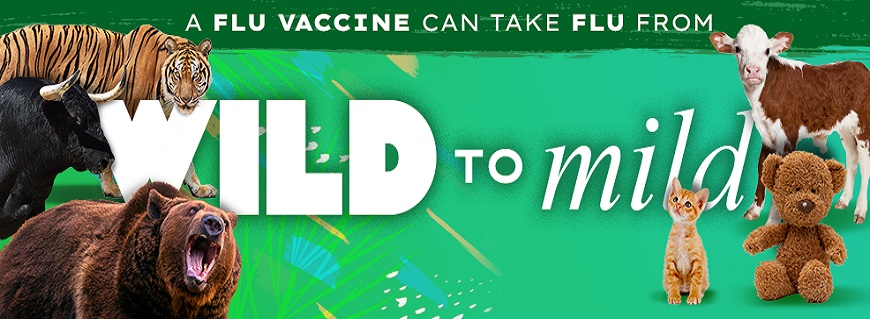
Seasonal Flu
Each year in the U.S., more than 200,000 people are hospitalized with flu complications. People most at risk for complications from the flu include pregnant women, adults age 50 and older, children under the age of five and their caregivers, residents of nursing homes and other long-term care facilities, and anyone who has certain underlying medical conditions.
COVID-19 and Flu Treatments Locator
- Find COVID-19 and Flu Medications (HHS) The locator displays pharmacies, clinics, and other locations with safe and effective COVID-19 and flu medications. These medications require a prescription from a healthcare provider. Please note that COVID-19 and flu medications may also be available at additional locations not shown on this locator.
Seasonal Flu Information for Children and Adolescents:
- Influenza and benefits of Influenza vaccination educational materials (NYSDOH)
- Flu (Influenza) Information for Child-Care Providers and Schools (NYSDOH)
- Flu (Influenza) Information (CDC)
Respiratory Viruses
Help prevent the spread of the flu by following the Four "C"s.
- Contact: Avoid close contact with people who are sick. If you are sick, keep your distance from others to prevent them from getting sick. Equally important is avoiding contact with your eyes, nose and mouth since the virus spreads by entering the mucous membranes in these areas.
- Contain: If you are sick, stay home from work, school and public areas. If you had a fever, stay home until 24 hours after your fever subsides to avoid spreading your germs.
- Cover: To prevent spreading the flu, cough or sneeze into your elbow or cover your nose and mouth with a tissue. Since you may be contagious even before you realize you are sick, it is important to make this habit routine.
- Clean: Clean your hands in warm soapy water often. Hand washing is one of the most effective, yet overlooked ways of preventing the spread of illness. Also, be sure to clean surfaces you touch frequently, such as doorknobs, water faucets, refrigerator handles and telephones.
Where can I go to get a flu vaccine?
Use the Vaccine Finder Tool to locate flu vaccines in your area. Flu shots are available for a fee from many area pharmacists, medical offices and neighborhood health centers . Residents should check with their health care provider or a local pharmacy chain.
Also, you can try one of the local neighborhood health centers listed below. Be sure to call ahead to find out if they have vaccine in stock.
Westchester Community Health Centers
Mount Vernon
107 West Fourth Street,
Mount Vernon, New York 10550
Phone: (914) 699-7200
Yonkers
30 South Broadway,
Yonkers, New York 10701
Phone: (914) 968-4898
Greenburgh
295 Knollwood Road,
Greenburgh, New York 10607
Phone: (914) 989-7600
Sun River Health
New Rochelle
14 Lawton Street, New Rochelle, NY 10801
For an appointment call: (855) 681-8700
White Plains
360 Mamaroneck Avenue, White Plains, NY 10605
For an appointment call: (855) 681-8700
Peekskill
1037 Main Street, Peekskill, NY 10566
For an appointment call: (914) 734-8800
Yonkers - Park Care
2 Park Ave, Yonkers, NY 10703
For an appointment call: (914)964-7862
Yonkers - Valentine Lane
503 South Broadway, Yonkers, NY 10705
For an appointment call: (914)965-9771
Open Door Family Medical Centers
Mamaroneck Open Door
689 Mamaroneck Avenue
Mamaroneck, NY. 10543
Phone: (914) 732-0233
Mt. Kisco Open Door
30 West Main Street
Mt. Kisco, New York 10549
Phone: (914) 666-3272
Ossining Open Door
165 Main Street
Ossining, NY 10562
Phone: (914) 941-1263
Port Chester Open Door
5 Grace Church Street
Port Chester, NY 10573
Phone: (914) 937-8899
Sleepy Hollow Open Door
300 North Broadway
Sleepy Hollow, NY 10591
Phone: (914) 631-4141
What do I need to know about the flu vaccine?
It’s recommended for everyone six months of age and older, according to the the Advisory Committee on Immunization Practices (ACIP).
And flu shots are especially recommended for:
- Pregnant women
- Children age five and under
- People age 50 and older
- People with certain chronic medical conditions
- People who live in nursing homes and long-term care facilities
- Health care workers or others who care for those at high risk for flu complications
While the flu shot is a good idea for most people, you should always check with your health care provider first, especially if you have a severe allergy to chicken eggs, have had a severe reaction to a flu vaccine or have developed Guillain-Barre syndrome within six weeks of getting a flu vaccine. Anyone with a moderate to severe illness with a fever should wait until they have recovered to get vaccinated.
